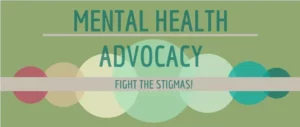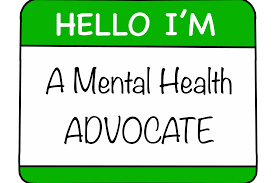Mental health advocacy is important because it helps to create a society that values mental health. Mental illness is becoming more common, but many people are still not properly educated on the subject. The stigma around mental illness stops people from getting help when they need it and stops other people from seeking out treatment for themselves. This blog post will tell you how to use your voice to help people who are sick. It’s important for their health. What can you do today?
Contents
Who Is A Mental Health Advocate?
Mental health advocates are people who use their voices to speak up for those who cannot speak for themselves. They fight for the rights of people with mental illness and work to break down the stigma that surrounds it. Mental health advocates come from all walks of life, but they all have one thing in common: they care about helping others.
Role Of A Mental Health Advocate
There are many different roles that a mental health advocate can play. Some of them include:
- Educating others about mental illness
- Providing support to those who are struggling
- Challenging the stigma around mental illness
- Promoting positive mental health practices
How Can I Become An Advocate?
Some organizations exist for people who want to make a difference, but don’t know where they fit in. If you feel compelled to speak up for those who suffer in silence, there are many ways to get started.
Some things you can do include:
- Educate yourself on mental health and the various illnesses that fall under this umbrella term. This is a great way to become more informed and comfortable with the topic, which will make it easier for you to talk about mental health issues with others.
- Joining or starting a support group for people with mental illness or their loved ones. This is a great way to connect with others who understand what you’re going through and can offer advice and support.
- Volunteering with or donating money to an organization that promotes mental health awareness or provides assistance to those affected by mental illness. Many organizations need help, so find one that speaks to your heart and get involved!
- Writing blog posts or articles about mental health advocacy, or sharing personal stories about your experiences with mental illness. This is a great way to reach out to others who may be struggling and let them know they are not alone.
- Talk to your friends, family members, and co-workers about mental health and the importance of seeking treatment if needed. It can be difficult to break the silence around mental illness, but every little bit helps.
What Can You Do?
There are many ways that you can become a mental health advocate. Here are a few suggestions:
- Speak out about mental illness. Talk to your friends and family about it, and share your stories on social media. The more people who talk openly about mental health, the less taboo it will be.
- Support organizations that work to improve mental health care. There are many great organizations out there, such as NAMI, that need your support.
- Volunteer your time or money to help those in need. Some people need help with their mental illness. They appreciate the help you can give them.
- Start a conversation. If you see someone struggling, start a conversation with them. Let them know that they are not alone and that you are there to support them.
What Can I Do In The Future With Mental Health Advocacy?
Mental health advocacy is an ongoing process; it’s something you have to commit to for the long haul. There are always new ways to get involved and make a difference. Here are some things you can do in the future:
- Attend a mental health awareness event in your community.
- Write to your local representatives and ask them to support bills that would improve access to mental health care or fund research for better treatments.
- Start a campaign on social media to raise awareness about mental health issues.
- Register as an organ donor (many people with mental illness struggle with chronic physical illnesses as well).
- Share this post so others can learn how they can become advocates too!
Benefits Of Becoming A Mental Health Advocate
There are many benefits to becoming a mental health advocate. You have the opportunity to make a difference in other people’s lives and your own life as well! Here are some of those benefits:
- People who have mental illness can feel isolated. If they reach out, it shows them that they are not alone and there is nothing wrong with feeling this way.
- You can get more support from people who understand what you are going through. They will be on “your side” when things seem tough.
- Giving back feels good. It will make you feel better about yourself. Give to the charity of your choice and it will help your self-esteem and happiness levels.
- You feel good about helping others. It also feels great to give back and make a difference in other people’s lives!
- It can be very rewarding, especially if you are supporting someone who is struggling with mental illness. You will be able to help them through their tough times even though it may seem impossible at first glance.
Limitations Of Becoming A Mental Health Advocate
There are some limitations to becoming a mental health advocate. It can be difficult to make a change, and you may not see results right away. Here are some of those limitations:
- It takes time and effort to make a difference in the world. You have to be willing to put in the work if you want to see change happen.
- Not everyone will agree with your point of view or what you stand for. This is okay! As long as you know why you are doing this, it doesn’t matter what others think.
- You may feel overwhelmed at times. There is a lot of work that goes into being an advocate, but it’s worth it in the end!
- The more people who speak out about mental health, the less taboo it will be.
- There are many great organizations out there, such as NAMI, that need your support.
Conclusion
As someone who has experienced depression myself, I can tell you that it’s not easy to find help. Mental health is still stigmatized and often seen as weaknesses or character flaws rather than a medical condition like any other disorder. That said, there are many ways to get the support you need-from therapy sessions with trained professionals to self-care practices such as meditation and journaling. If you’re having trouble finding your way out of depression, know that you don’t have to go through this alone. You deserve love, happiness, and mental wellness too! The resources below will point you in the right direction for getting started on your journey back towards living well again.”
If you are looking for affordable Online Counseling MantraCare can help: Book a trial therapy session







